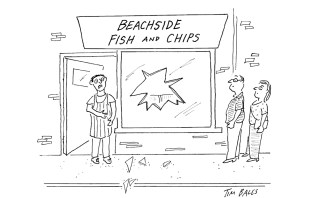According to Clive James: ‘A life without fame can be a good life, but fame without a life is no life at all.’ In My Family: The Memoir, the famous comedian David Baddiel proves he’s also had a life. Or, at least, a family.
For anyone who hasn’t been paying attention – and Baddiel, as he admits, craves attention – or who has never watched television or listened to the radio over the past 30 or 40 years, Baddiel is famous as a stand-up comedian specialising in a ‘sweary and often not-very-nice-Jewish-boy style of comedy’, as a TV chat show host with fellow comedian Frank Skinner, presenting Fantasy Football League and Baddiel and Skinner Unplanned. He also writes films, sitcoms, novels and non-fiction, including the recent Jews Don’t Count. Oh, and he’s famous for co-writing the football anthem ‘Three Lions’, with its irritating earworm refrain: ‘It’s coming home.’

The book chronicles Baddiel’s ‘strange mad damaging childhood’, growing up in a Jewish household in north London –though, as Baddiel is at pains to point out, this was not the Jewish north London of the goyish imagination. It was Dollis Hill. There are some nice bits about him attending the North West London Jewish Day School, chosen by his parents for him and his brothers as the school where they were ‘least likely to get knifed’. We also get glimpses of Baddiel at Haberdashers’, and at Cambridge, of him thriving in the Footlights, and accounts of his early fame and success.
But the main subject of the book, apart from Baddiel, is his mother Sarah, who died in 2014 and who was clearly what one might call a ‘character’. He describes her as a ‘fantasist’. ‘She was someone who, at various stages of her life, had adopted different – and obsessive – personas.’ She was a ‘child of the Sixties, a woman of the sexual revolution’, a dealer in golf memorabilia and also an everyday 1970s kind of a mum, who wore ‘bright green flared Lurex slacks’ and who would say: ‘I tell you who I do like – that Paul Daniels.’
As one might expect, funny stories abound, and not just about Sarah. This is a celebrity memoir, after all. There are some Ned Sherrin-type anecdotes about Baddiel’s embarrassing encounters with Peter Gabriel, Andrew Lloyd Webber, Peter Cook and Prince Edward, but the book’s other main character is Baddiel’s father Colin, who towards the end of his life suffered from dementia and who has already been the subject of Baddiel’s 2017 television documentary, The Trouble with Dad. These parents may indeed be the most written and talked about in Britain. Baddiel acknowledges that some of the stories in his memoir will be familiar to anyone who already knows his work, and his tweets, which feature throughout, or who saw his one-man show, My Family: Not the Sitcom, or his Who Do You Think You Are? They can even be dimly discerned, as through a glass darkly, in his first novel, Time for Bed (1996).
But it’s not all bantz and rehash. Baddiel is possessed of what he calls an overwhelming ‘truth urge’, ‘the David Baddiel Truth-At-All-Costs Urge’, which he defends as a kind of artistic method, and which leads him to push on and on into increasingly uncomfortable territory:
The only way to combat untruth is with detail. To be more specific, with idiosyncratic detail. The more detailed and the more idiosyncratic the presentation of who you are, the more it works as evidence. As truth.
But truth hurts. He describes his childhood home, for example, as ‘an over-sexualised house’, with pornography left lying around on the breakfast table, and there was clearly a lot of unhappiness there. Sarah remains clearly adored by Baddiel, for all her faults: ‘The rich strangeness of my mother cannot be conveyed in compliments but in stories, true stories.’ Colin, on the other hand, a scientist who became a dealer in Dinky Toys, emerges as a rather diminished figure, ‘old school, relentlessly male, thriving on the put-down, the jab and the comedy of insult’ – a bit of a bully, in other words.
But the real villain of the piece is someone called David White, ‘the embodiment of 1970s man’ – bearded, virile, pipe-smoking – who was still alive at the time of writing and who for many years was Sarah’s lover. He becomes the target of much of the book’s comic ire, so much so that in the end one can’t help but feel rather sorry for the poor bloke.
My Family offers a number of useful lessons and insights. The one I’ll take away is this: do not commit adultery with the mother of a future comedian. Seriously, don’t. Mr White has a lot to answer for.







Comments